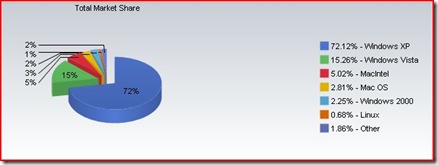How to get TechMeme’d – write about something bashing Vista
This morning, I read Matt Asay’s article on CNET about “92% of developers ignoring Vista” (via TechMeme). Just like the title of my post, the title of his post is extremely misleading. If you’ve read some of Asay’s posts in the past, especially when it comes to Microsoft related articles, I think you’ll notice that Asay is a glass half-empty kind of guy. Also, MG Siegler followed up with a post that looked eerily similar on VentureBeat: “Developers, developers, developers ignoring, ignoring, ignoring, Vista”.
I recommend that you read Evan’s press release and make the assessment for yourself. But I want to refute some claims that Asay, MG and even the release make. To preface, Microsoft has the .NET framework, which ships natively with Vista and runs on XP. By writing an application for .NET framework (v3.0+), you can be rest assured that the application will work seamlessly on either OS (caveat : there are some security related enhancements that were added in Vista that would require some amount of additional work for developers) . The need to distinguish developers who specifically target XP and developers who specifically target Vista makes little sense, unless they plan on writing native applications.
So that said, here’s why Asay’s and MG’s overall analysis of the Evan’s press release is just plain unwarranted:
XP and Vista’s application runtime platform are not exactly mutually exclusive. Developers could be targeting the .NET framework which runs on both OS’s.
XP is still a very popular operating system. I work with several independent software vendors (ISVs) who develop applications both for the managed and unmanaged worlds of Microsoft’s application platform.

[courtesy MarketShare By Net Applications ]Given this data, if you were to look at this chart as an ISV developing a desktop application, which OSs would you target first?
The Evan’s press release, granted it is just that and not the entire report, does not talk about who these applications developers are (I spoke about ISVs in the previous bullet). Are they enterprise developers? ISV developers? Web developers? Database developers? Consultants? Are they writing managed or unmanaged applications? If a web developer were asked if they develop for Vista, what do you think they would say?
Is 380 a good enough sample set to be surveyed? According to this article, there were approximately 3.34 million software developers in North America in 2007. 380 is about 0.01% of the (supposed) total population of software developers in North America.
From the press release:
“that coupled with interest in alternative operating systems is suppressing development activity and that in turn will further erode Vista’s acceptance.”
Uhh, what now? Are we now talking about a development platform as opposed to a target runtime platform? I’m not sure how that is related to this report at all.
As a member of Microsoft’s Developer Evangelism team, I can tell you that the emphasis on continuing to make our operating systems the best ones for developing and deploying applications is still massive. We’ve made huge strides with the new versions of our frameworks (v2.0, v3.5). The agility the developer division, led by Somasegar, continues to show is extremely impressive. Scott Guthrie recently announced a beta to a Service Pack to .NET v3.5 where he discusses all the new enhancements planned for the framework - as an ex-developer, I wept with joy when I saw that post. I encourage you to look at all the benefits that the .NET framework provides and as a result, that the runtime platform can reap.
“ai”
Comments
Anonymous
June 16, 2008
PingBack from http://www.vistafactory.com/how-to-get-techmeme%e2%80%99d-%e2%80%93-write-about-something-bashing-vista/Anonymous
June 17, 2008
Thanks for writing that up -- I was too lazy. But it did strike me as ridiculous: almost no one targets one or the other; most software runs equally well on both.